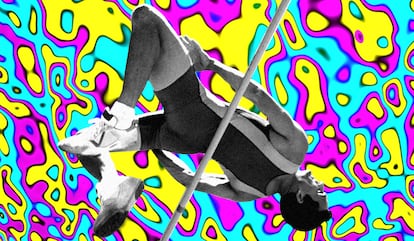An ‘Olympics’ that allows doping? A billionaire’s controversial dream that could change sport forever
Australian tycoon Aron D’Souza wants to organize the controversial Enhanced Games, a competition that still has no date or location, which sets out to test the limits of the human body by allowing performance-enhancing drugs

Thirty-three years ago, U.S. athlete Mike Powell jumped 8.95 meters, setting a record that has yet to be broken. Even earlier, in 1985, Marita Koch ran the 400 meters in 47.6 seconds — faster than any woman had ever done before or has done so now — setting another of the longest-standing athletics records and winning gold for East Germany, officially known as the German Democratic Republic. The GDR — which no longer exists — had long been suspected of doping its athletes. If the Enhanced Games — a sports competition with a format similar to the Olympic Games where “performance enhancements” are permitted — are allowed to go ahead, these records may soon be broken as well.
At first glance, the Enhanced Games seem like a crazy project thought up by political science students overly enthusiastic about libertarian ideas. And yet, the Enhanced Hames are financed by several billionaires, supported by dozens of figures in science and sport and driven by a social theory that’s taken the world by storm: transhumanism. So it is quite possible that organizers will soon announce the first edition.
According to the president of the Enhanced Games, Australian tycoon Aron Ping D’Souza, the event aims to demonstrate “what the human body is truly capable of.” The competition’s website states that it will allow any substance that improves the speed, strength or performance of athletes. It clarifies, however, that the process will be carried out under medical supervision and that substances harmful to health, that cause irreversible changes or that are highly addictive, will be prohibited.
Before leading the Enhanced Games, D’Souza worked for Peter Thiel, the founder of PayPal. Thiel indeed is the project’s main investor. As well as his support for Trump, the tycoon is known for his interest in the “heterodox thinking” of French anthropologist and philosopher René Girard and his obsession with progress and the future. If it is “disruptive” all the better, he argues in his book Zero to One. His biographer, journalist Max Chafkin, described him as a “dangerous man.”
The controversial debate about what is and is not doping
Back in the 1980s, there was already talk in right-wing libertarian circles of the theoretical possibility of a sport competition with no restrictions on performance-enhancing technology — be it physical, such as prostheses; or chemical, such as banned substances.
“This neoliberal spirit has also animated most defenders of transhumanism, who have promoted the idea of not placing restrictions on the use of technology to improve human nature, supposedly, in order to generate better societies,” explains Javier López Frías, professor at the University of Pennsylvania and specialist in sports philosophy. “The gurus of Silicon Valley have also become defenders of these ideals and I believe for egocentric reasons, not at all concerned with the common good. From an ideological point of view, a perfect breeding ground has been created for such a competition to be put into practice.”
“However,” he clarifies, “empirical studies show that both the general population and athletes and their fans significantly support the need for anti-doping regulations and practices. What many question is the way in which they are carried out by the World Anti-Doping Agency [WADA]. This crisis of legitimacy seems to me to be another reason for the emergence of the Enhanced Games, and that is because their strongest defense has to do with two issues that need much improvement in the current anti-doping system: the protection of athletes’ health [for example, they propose athletes undergo a health check to see if they are healthy enough to compete] and incorporating their voices in decision-making.”
Another argument put forward by the Enhanced Games is that, despite the efforts to prevent doping, many athletes continue to take banned substances. What’s more, they do in unsafe conditions, to avoid being caught. While López Frías generally opposes the idea of the Enhanced Games, he does agree with this point: “The current high-level competition system puts athletes in vulnerable situations: ‘Either you dope yourself, or you cannot compete at the highest level,’ or ‘if you do not sign the clauses accepting the WADA system, you cannot participate,’ And in many cases, they push them to make decisions that are harmful to their safety.”
So is it possible that some athletes dope themselves because they feel compelled to? “There are always self-destructive people who will do anything to outdo others, and the existence of this type of competitor creates a domino effect,” the professor answers. “The perception that others are doping, whether true or not, often leads those who want to be competitive to dope as well. Everyone involved in this circle can identify themselves as martyrs. Lance Armstrong did so in his famous interview with Oprah Winfrey. He blamed his impulse to cheat to the competitive urge he developed as a child in a humble family and to the fighting spirit that allowed him to beat cancer.”
So what would change if the anti-doping rules were eliminated or relaxed, as proposed by D’Souza? “Nothing. If doping is banned, the objective remains the same, only with fewer controls. If anything, liberalizing doping would make this vicious circle even more dangerous because athletes who continued to operate under the (possibly well-founded) suspicion that others were doping would be driven to push themselves further and further beyond their limits,” says the expert.
For the moment, if there is one thing that is clear about the project, it is that it will not take place in any country in the European Union. To put it into practice, “it is important to know the regulations of the place where the headquarters of the entity is located and/or where the event itself is held,” says Maite Nadal, a lawyer specializing in sports law. In Spain, for example, “what is classified as a crime is the prescription or supply of prohibited substances, but it is not a crime if the result of a test is positive.”
Of course, if the Enhanced Games do go ahead (perhaps in Singapore, the quintessentially liberal state), it will no doubt affect more than the world of sport.
Towards post-human athletes (and citizens)
Most of the investments of Peter Thiel — considered by many to be the most influential man in Silicon Valley (more so than Elon Musk or Mark Zuckerberg), seem straight out of a science fiction novel. For example, his company COMPASS is dedicated to bringing to market therapies based on psilocybin, a psychoactive compound found in some mushrooms that could be used to treat depression. Indeed most of the tycoon’s resources are invested in similar businesses related to health or biotechnology. The same is true of his colleague Christian Angermayer, founder of Enhanced Games.
Angermayer is another billionaire who is convinced that “we are entering a golden age of human enhancement,” an argument he makes on his blog. He also believes that Viagra and Ozempic (a drug designed to treat diabetes but widely consumed for weight loss), are the first examples of “enhancement drugs” that have reached the general public, and more will soon follow.
But what exactly is “enhancement”? According to Angermayer, it is the step prior to transhumanism, to the possibility of developing “superhuman abilities” by integrating different technologies and devices into our bodies. However, the German investor is relatively conservative and believes that these advances can only be implemented under medical supervision and under different regulations (although he does not clarify whether these would be imposed by the state or other institutions).
Julian Savulescu is a doctor and professor of ethics at Oxford University and, speaking to EL PAÍS, he explains that none of these ideas are far-fetched: “Glasses are also an example of how science and technology help us improve our lives. So the discussion about what is medicine and what is enhancement is not technical, but ethical: what we can or cannot do and what we will support or finance. Traditionally, when some enhancement began to be possible, the user began to be considered sick, even if that person was perfectly normal. That has allowed medicine to be financed. In the future, the use of enhancements will become more widespread and much more transparent, because what we are interested in is gaining autonomy and well-being.”
Beyond religious opposition to “enhancements” (which is partly in line with what philosopher Michael Sandel has said about gene editing: it is based on an almost reverential respect for “what is natural”), more practical critics often claim that these advances will serve to increase inequality between those who can afford them and those who cannot. Savulescu is blunt on this point: “Simply put, they will have to be made free or very cheap, because it is precisely if you ban them that only the rich will be able to access them.”
As for enhancements in the world of sport, Savulescu believes that, far from adulterating competition, the use of substances could help to alleviate certain genetic or socio-economic inequalities between competitors. “We know what the safe levels of red blood cells, testosterone, growth hormone are,” he explains. “Right now, the anti-doping agency is trying to eliminate any exogenous agent, regardless of whether it is safe or not, if it improves performance. They should change the rules and allow their use up to safe levels. For example, an athlete with a lot of resources can increase their red blood cell level through altitude training or an expensive hypoxia chamber. An injection of EPO [synthetic erythropoietin] would give the same result, and the only difference is in the use of the needle: that is not morally relevant. The only thing that should matter is whether the level of red blood cells in the blood is safe or not.”
López Frías is not so optimistic: “Most likely liberalizing the use of performance-enhancing technologies will lead to greater dominance of those with more resources. You don’t have to look far to see examples of this: Formula 1 is dominated by teams with better engineers and bigger budgets.”
The debate continues. And given the topic would have seen ridiculous just a few years ago, this is perhaps the biggest sign (along with billionaire’s unashamed search for immortality) that times are changing.
Angermayer is clear: if they are held, the Enhanced Games will be the best calling card for human enhancement technology. “The ability for athletes to achieve record-breaking accomplishments within a secure environment will inspire the public’s imagination, reinforcing the profound impact of science on human progress,” he says.
For now though, they are inspiring memes and as much interest as backlash, and in some cases, fear.
Sign up for our weekly newsletter to get more English-language news coverage from EL PAÍS USA Edition
Tu suscripción se está usando en otro dispositivo
¿Quieres añadir otro usuario a tu suscripción?
Si continúas leyendo en este dispositivo, no se podrá leer en el otro.
FlechaTu suscripción se está usando en otro dispositivo y solo puedes acceder a EL PAÍS desde un dispositivo a la vez.
Si quieres compartir tu cuenta, cambia tu suscripción a la modalidad Premium, así podrás añadir otro usuario. Cada uno accederá con su propia cuenta de email, lo que os permitirá personalizar vuestra experiencia en EL PAÍS.
¿Tienes una suscripción de empresa? Accede aquí para contratar más cuentas.
En el caso de no saber quién está usando tu cuenta, te recomendamos cambiar tu contraseña aquí.
Si decides continuar compartiendo tu cuenta, este mensaje se mostrará en tu dispositivo y en el de la otra persona que está usando tu cuenta de forma indefinida, afectando a tu experiencia de lectura. Puedes consultar aquí los términos y condiciones de la suscripción digital.









































